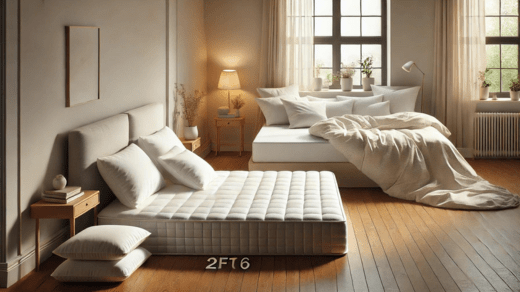There are few things better in life than a good night’s sleep. Getting enough sleep makes us feel good and keeps us physically and mentally healthy. If you’ve ever noticed you’re regularly coming down with coughs and sniffles or that you’re stressed, irritable and low on energy, then a lack of sleep is often the culprit. We’re always striving for a better night’s sleep, and we’re frequently asked whether a bigger bed equates to a better night’s sleep. Do king-size beds offer more restorative slumber than a standard single bed? Read this blog post to find out!
Why is Getting a Good Night’s Sleep So Important?
First, though, let’s look in more detail at why we need that higher quality of sleep. We’ve all heard from somewhere, or rather, that we need at least 7 or 8 hours of sleep per night – but why? Why does it matter if we only sleep lightly? Or whether we wake up several times a night? Well, those symptoms of a lack of sleep that we mentioned at the start – are only the start of the problems you might expect from continually poor quality (and quantity) of sleep over the years.
Certain diseases and medical conditions have been linked with poor sleep, the latter acting as a contributing factor towards the former. Heart disease, stroke, type 2 diabetes, and mental health problems such as depression and anxiety are all known to be conditions – at least partially contributed towards – by poor sleep.
How is Bed Size Linked to This?
You might be sitting there wondering how the size of the bed relates to all of this, but the fact is that it does. Smaller 2ft 6 mattresses can cramp you up – in a smaller bed, for instance, it’s much less likely that you’ll be able to fully stretch out. That cramped position can, in turn, lead to your sleep, causing you aches and pains – precisely the opposite of what you want from your sleep! A 4ft 6 double bed bigger bed removes this risk, and you can stretch it out to your heart’s content.
A bigger bed equals better sleep, and better sleep equals better health. What’s not to like? So, in answer to the question, is it a case that the more significant the bed, the better the sleep quality? Yes! When it comes to sleep, it’s all about going large!
What Bed Sizes Are There?
If you’ve ever been shopping for a bed or mattress, you’ll know how confusing it can be to figure out which one you’re after. Because of this, we thought we’d list the main types here – so that you’ve got a reference point for any terms that have already been (or will be) mentioned in this post. The most standard sizes – going from smallest to largest – are:
Small Single
Single
Double
King
Super King
How Many People Are Sleeping in the Bed – One or Two?
When it comes to whether a bigger bed offers better quality sleep, the number of people using it comes into play. For instance, a singular person might not notice any difference in their sleep quality between a standard double and king-sized bed, whereas, for two people using the bed, that extra space can make all the difference.
Have you ever woken up after being accidentally elbowed, jabbed or prodded by a sleeping partner? That’s far less likely to happen if you’ve both got ample space and in that case, a bigger bed undoubtedly gives a better night’s sleep. A previous study from the National Bed Federation found that through ergonomic trials, couples experienced better sleep in bigger beds.
A bigger bed also factors in that common early family occurrence of one of the children coming into sleep with the parents. If you’ve got a larger bed, “there were three in the bed” won’t be so uncomfortable…
Bigger Often Means Better Quality, and Better Quality Almost Always Means Better Sleep
Whilst most mattresses are of high quality—whatever the size—there seems to be a general trend around the industry in that the best quality gets channelled towards the biggest beds. Whether it is because larger beds naturally tend to also coincide with the luxury beds category would need more research, but anecdotally at least, if you want the best quality, you tend to look for a larger-sized bed.
Other Factors That Affect Sleep Quality
We’ve established now that a bigger bed can help improve sleep quality, but it’s far from the only factor that can help or hinder our sleeping patterns. Blue light, for example. In today’s world, we’re never far from a gadget or three. And whilst our mobiles, tablets, and laptops help our lives in many different areas, our sleep quality isn’t one of them. Blue light suppresses the body’s release of a particular hormone called melatonin, which plays a large role in making us sleepy or drowsy.
Another issue that can affect sleep quality is the mattress itself. If you’ve got the wrong mattress for you, then it can impact your sleep quality without you even realising it. Too firm or soft a mattress can cause back pain, which in turn reduces the quality of sleep. Finally, you should avoid caffeinated drinks too late in the day, with many people advising that you shouldn’t have any caffeine past midday.
If you crave a hot drink, consider hot chocolate or herbal tea, which are lower in caffeine. So, to get the best possible quality of sleep, you should consider getting a bigger bed, getting the ideal mattress for you, restricting your use of electronic devices in the hour or two before bed, and finally, cutting out the caffeine where you can—particularly in the evening.

